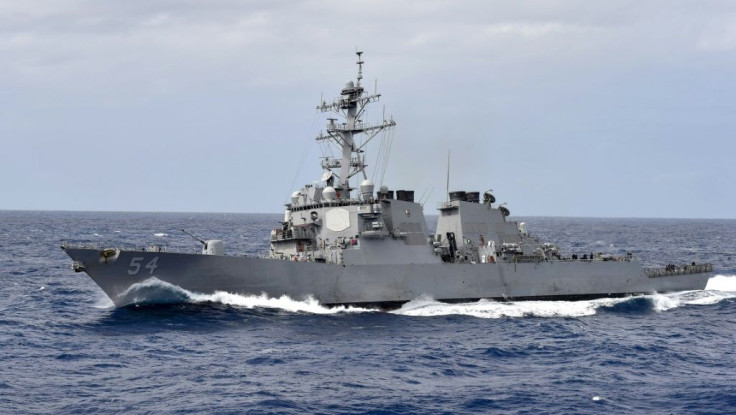US Navy Trespasses Show It's Nervous Of China's Growing Capabilities: Global Times
KEY POINTS
- The sailing of USS Benfold near the Spratly Islands has angered Beijing
- China said the U.S. military was becoming anxious and less confident
- It called out the U.S. for "seeking to contain China's development"
The U.S. Navy warship's sailing near the Spratly Islands in the South China Sea on Saturday has triggered Beijing, which said the "U.S. provocations" exposed "its anxiety facing the growing capabilities of the People's Liberation Army (PLA)."
Lashing out at U.S. Navy's "navigational hegemony," an article in Chinese state-backed Global Times, quoting analysts, said the U.S. warplanes and warships approach the waters and airspace near China to flex their muscles and show off their presence.
According to the U.S. Navy, the guided-missile destroyer USS Benfold had sailed near the Spratly Islands (called Nansha Islands in China) in a "freedom of navigation operation."
"Facing China's growing military capabilities to defend itself, the U.S. military is becoming anxious and less confident in carrying out its own hegemony, and that is why the U.S. is ramping up provocations in an attempt to prove its might," Global Times quoted Wei Dongxu, a Beijing-based military expert.
"But the US will end up lifting a stone only to drop on its own feet," Wei added. In response, China is now holding military exercises in a large area in the South China Sea from Sunday to Wednesday.
Not just the transit of the USS Benfold, the new arms sales deal to the island of Taiwan has also angered Beijing. The US State Department approved the possible sale of military-technical assistance to Taiwan for an estimated cost of $108 million last week.
"These recent military provocations fully demonstrate the US' hypocrisy in calling for "guardrails" for bilateral relations," a Beijing-based unnamed analyst told Global Times on Sunday.
The expert said the U.S. "shouts about the need to manage divergences and prevent conflicts," yet engages in dangerous provocations over the Taiwan question and the South China Sea issues. He said these stances confirmed the "US' tradition in foreign policy - talk the talk but not walk the walk."
Diao Daming, an associate professor at the Renmin University of China in Beijing, called out the U.S. for seeking to contain China's development while proposing self-serving "guardrails."
The widening gap between the U.S.'s words and deeds has made the country "not trustworthy at all" in international affairs. Yet, China has fully recognized the U.S.'s nature and is prepared for all scenarios - China is always open for dialogue and communication but at the same time is on high alert over US provocations, the Global Times report said.

© Copyright IBTimes 2024. All rights reserved.











